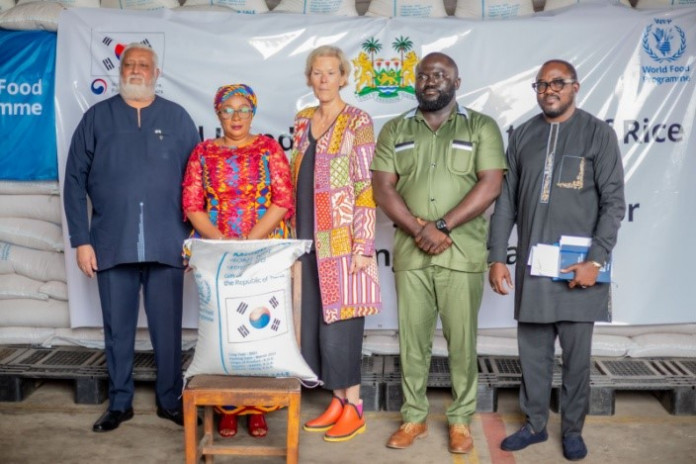By Amin Kef Sesay
The World Food Programme (WFP) on Wednesday July 3, 2024 received a substantial in-kind donation of 2,400 tons of rice from the Ministry of Agriculture, Food and Rural Affairs (MAFRA) of the Republic of Korea. This rice will be used to provide essential school meals to over 106,000 children across 500 schools in some of the most vulnerable and food-insecure regions of Sierra Leone throughout the next academic year.
The donation comes at a critical time as Sierra Leone faces increasing food insecurity due to the economic fallout from the Ukraine crisis, macroeconomic decline and the lingering impacts of the COVID-19 pandemic. This contribution will complement WFP’s existing food basket, which includes beans, vegetable oil, salt and fresh vegetables, as well as 1,000 tons of rice purchased locally from smallholder farmers under the Feed Salone initiative.
At the handover ceremony held at the WFP Kissy Warehouse, Mahesh C. Nandwani, Honorary Consul of the Republic of Korea in Sierra Leone, emphasized the importance of the MAFRA rice donation in supporting the national school feeding program. “It is hoped that Korea’s continuous, predictable and high-quality rice contribution will offer a ray of hope to school children who no longer have to worry about where their next meal will come from,” he stated.
Yvonne Forsen, WFP Country Director in Sierra Leone, expressed profound gratitude for the Republic of Korea’s support. “The rice safeguards the investment in human capital development in Sierra Leone and ensures that children can learn and develop,” Yvonne Forsen said. She highlighted the crucial role of school feeding in keeping children in school and providing them with balanced, cooked meals at a time when many households are struggling.
The 2,400 tons of rice donated will help ensure that children in supported schools can continue their education without the burden of hunger. By providing reliable and nutritious meals, the school feeding program supports both immediate food needs and long-term educational outcomes, such as improved enrollment and attendance.




